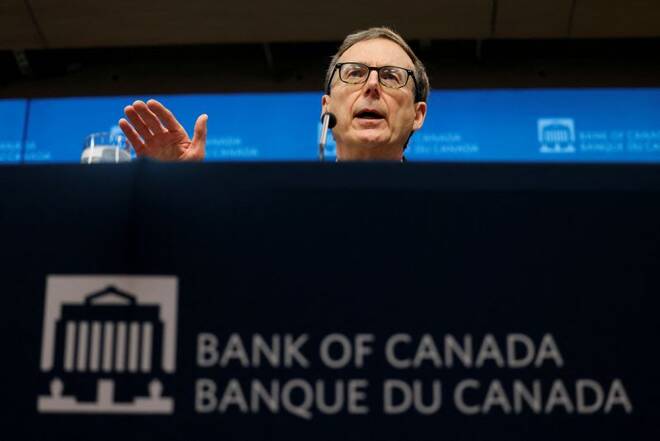Advertisement
Advertisement
Bank of Canada seen on hold even as economy accelerates
By:
By Fergal Smith TORONTO (Reuters) - The Bank of Canada is expected to take in stride surprising recent economic strength and leave interest rates unchanged at its meeting on Wednesday, pinning its hopes on activity cooling as higher borrowing costs sink in, analysts said.
By Fergal Smith
TORONTO (Reuters) -The Bank of Canada is expected to take in stride surprising recent economic strength and leave interest rates unchanged at its meeting on Wednesday, pinning its hopes on activity cooling as higher borrowing costs sink in, analysts said.
Last month, the Bank of Canada became the first major global central bank to pause its rate-hiking campaign, after lifting its benchmark rate to a 15-year high of 4.50%. It said no further tightening would be needed if the economy slows, or even moves into a slight recession, as it expects.
While inflation has cooled in recent months, other economic indicators are pointing to an economy that is picking up pace from a sluggish fourth quarter.
Preliminary data last week showed that gross domestic product (GDP) rose by 0.3% month-over-month in February, building on a stronger-than-expected 0.5% gain in January. Employment data for March showed a seventh consecutive job gain.
“The economy is showing renewed momentum, with more people working and seeing their incomes rise,” said James Orlando, a senior economist at TD Economics. “They are out spending again. This will carry through to higher economic growth.”
That is welcome news for most, but not for Bank of Canada (BoC) Governor Tiff Macklem, as it could call into question his decision to announce a conditional rate pause in January.
Macklem is seeking to rebuild public trust after facing criticism for acting too slowly to tame inflation, which spiked after pandemic restrictions were lifted. The central bank has admitted to having initially misjudged the price pressures.
That effort could be complicated by Prime Minister Justin Trudeau’s recent budget, which has outlined billions of dollars in new spending.
Concerned but hopeful
February’s surprisingly strong figures have led economists to revise up their GDP estimates, with the median forecast of six economists surveyed by Reuters pegging first-quarter growth at 2.5%, far higher than the BoC’s projection of 0.5%.
“For the BoC, we still expect a hold,” Orlando said. “They will likely be concerned about the rebound in economic activity, but we think they are still hopeful of a deceleration over the remainder of 2023.”
All 33 economists polled by Reuters agree that the BoC will hold its key overnight rate steady on Wednesday when it makes its next policy announcement. Money markets are betting that the central bank’s next move will be a cut.
Investors reason that the full impact of higher borrowing costs has yet to be felt, and recent stress in the global banking system has fueled concern of a credit crunch, including in the United States. Canada sends 75% of its exports to its southern neighbor.
“We see growth being driven largely by an easing of prior supply constraints … rather than a significant strengthening in domestic demand,” said Andrew Grantham, a senior economist at CIBC Capital Markets.
“We suspect that the Bank of Canada will view the apparent strength in Q1 GDP similarly, and increase its estimate of potential growth.”
Potential growth is the rate at which activity in the economy can increase without causing inflation, so a rise in the estimated level could reduce the need for a hawkish shift from the central bank.
Economists say that rapid population growth as well as easing supply chain disruptions could add to Canada’s potential growth, which was last estimated by the BoC to be 2.25% on average over 2023 and 2024.
Canada’s economy faces headwinds from higher borrowing costs and financial stability concerns, while inflation has cooled more than in the United States, said Nathan Janzen, assistant chief economist at Royal Bank of Canada.
“So still good reasons on both sides for the BoC to stick with a wait-and-see approach for now,” Janzen said.
(Reporting by Fergal Smith; Editing by Steve Scherer and Andrea Ricci)
About the Author
Reuterscontributor
Reuters, the news and media division of Thomson Reuters, is the world’s largest international multimedia news provider reaching more than one billion people every day. Reuters provides trusted business, financial, national, and international news to professionals via Thomson Reuters desktops, the world's media organizations, and directly to consumers at Reuters.com and via Reuters TV. Learn more about Thomson Reuters products:
Advertisement
